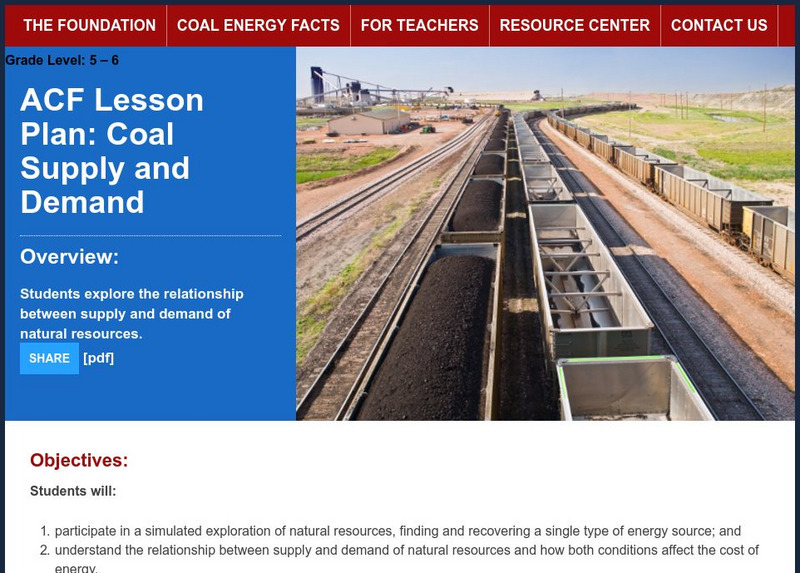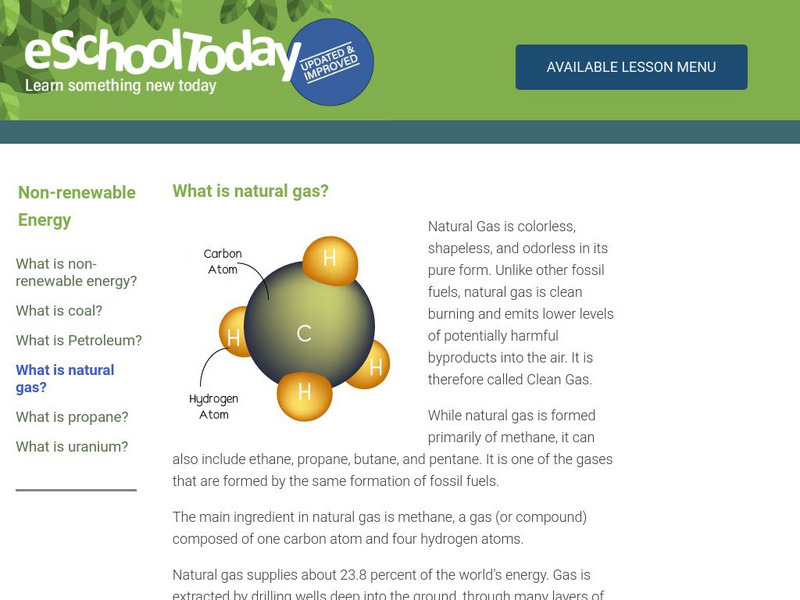Annenberg Foundation
Annenberg Learner: The Habitable Planet: Energy Challenges
With this resource, users join investigators in the exploration of humans' use of and dependence on the many energy resources. Learn about new technologies such as carbon capture and sequestration as an alternative to reduce our carbon...
National Geographic
National Geographic: Encyclopedic Entry: Non Renewable Energy
A good primer on non-renewable energy sources. Covers the overall advantages and disadvantages, and discusses the different types and their pros and cons. Includes a slideshow with captions.
Khan Academy
Khan Academy: Energy Through Time
The quest for energy has always been a balancing act. As humans have gained greater control over their environment, they've found abundant resources - and faced numerous challenges. This article traces the history of our quest for energy.
Other
First Energy: The Electric Avenue: Energy Fun Factory
Here, students can learn all about energy sources and electricity. Activities include games and calculating energy costs in their homes.
Other
American Coal Foundation: Lesson Plan: Conserving Electric Energy
Lesson plan focuses on electricity use and energy consumption, while engaging students in a hands-on activity that helps them comprehend the effects of regulation and conserving energy resources.
US Department of Energy
U.s. Department of Energy: Coal: Our Most Abundant Fuel
The U.S. has enough coal to last for the next 200-300 years. So why are we not using more of it? This article describes the different types or "ranks" of coal, the history, and the problems with burning coal for energy.
Other
Texas Comptroller of Public Accounts: The Energy Report: Coal [Pdf]
Chapter 7 of a report on the energy industry in Texas. It looks at coal, its history, its uses, its economic impact in Texas, consumption, mining, and the transportation of coal. The process of generating electricity from coal is...
Other
American Coal Foundation: The United States of Energy
Help students learn about coal and its role in energy and electricity. The United States of Energy is a complete classroom program that allows students to learn about the many energy sources that power the United States and includes...
University of California
Understanding Science: Cold Fusion: A Case Study for Scientific Behavior
Major issue--the energy sources currently available to the world all have major drawbacks in the long term. Oil is efficient but leads to climate change. Coal is plentiful but polluting. Solar energy is appealing but only as dependable...
National Academies of Sciences, Engineering, and Medicine
The National Academies: Our Energy Sources: Fossil Fuels
An overview of fossil fuels used in the United States. Coal, oil and natural gas are listed with information about each energy source.
Other
American Coal Foundation: Lesson Plan: Coal Supply and Demand
In this one period lesson, students will learn the relationship between supply and demand for natural resources such as coal, and explore how these conditions affect the cost of energy.
US Geological Survey
Usgs: Energy Resources Program
Find the latest research and publications on the subject of energy, in particular: oil, gas and coal resources.
Energy for Sustainable Development
Esd Bulgaria: Kids & Energy: Electricity
Electricity is the flow of electrical power or charge. It is a secondary energy source which means that we get it from the conversion of other sources of energy, like coal, natural gas, oil, nuclear power and other natural sources, which...
Curated OER
University of Texas: Maps: Central Asia: Fuel and Energy Centers
Looking for coal reserves in Central Asia? This map from the University of Texas shows the fuel reserves and energy sources in the Central Asia region.
Climate Literacy
Clean: Us Energy Production and Consumption
In this lesson students will compare and contrast regional energy production of 5 different US regions, including California, Illinois, Pennsylvania, Texas, and Washington. Students will also analyze production and consumption data of US...
Energy for Sustainable Development
Esd Bulgaria: Kids & Energy: Energy Timelines
A collection of timelines showing the history of developments in the use of different fuels and methods of getting energy - wood, electricity, coal, oil, nuclear power, and fuels used in transportation.
US Energy Information Administration
U.s. Eia Energy Kids: Coal
Easy-to-understand information on mining and transporting coal, producing it, uses of coal, and coal and the environment.
PBS
Pbs Learning Media: Primary Source: Boomtimes: 20th Century Mining Mojave Desert
This collection uses primary sources to explore twentieth-century mining in the Mojave Desert.
TED Talks
Ted: Ted Ed: Why Aren't We Only Using Solar Power?
Solar power is cheaper and more sustainable than our current coal-fueled power plants, so why haven't we made the switch? The real culprits here are the clouds, which make solar power difficult to control. Alexandros George Charalambides...
eSchool Today
E School Today: Non Renewable Energy
Learn what non-renewable energy is and the different types.
University of Arizona
Pulse: Powerful Explorations of Health and Energy
A cross curricular unit where students simulate an energy task meeting to discuss protecting human health through energy policies. The unit covers content for twelfth grade in math, physics, language arts, and government. Topics reviewed...
Cynthia J. O'Hora
Mrs. O's House: Clean Coal Technology
There is a debate on the table discussing whether clean coal is a viable source of energy or not. Understand the opposing views and decide what side of the table you fall on. Extension resources and activities are provided.
eSchool Today
E School Today: Nonrenewable Energy: Natural Gas
Get the basics on nonrenewable energy. Learn about its uses and conservation.
National Academies of Sciences, Engineering, and Medicine
The National Academies: Our Energy Sources: Natural Gas
Energy production from natural gas is less destructive to the environment than energy produced from coal, but it is still produced from fossil fuels. While advances have been made in reducing its detrimental effects, our resources are...


















